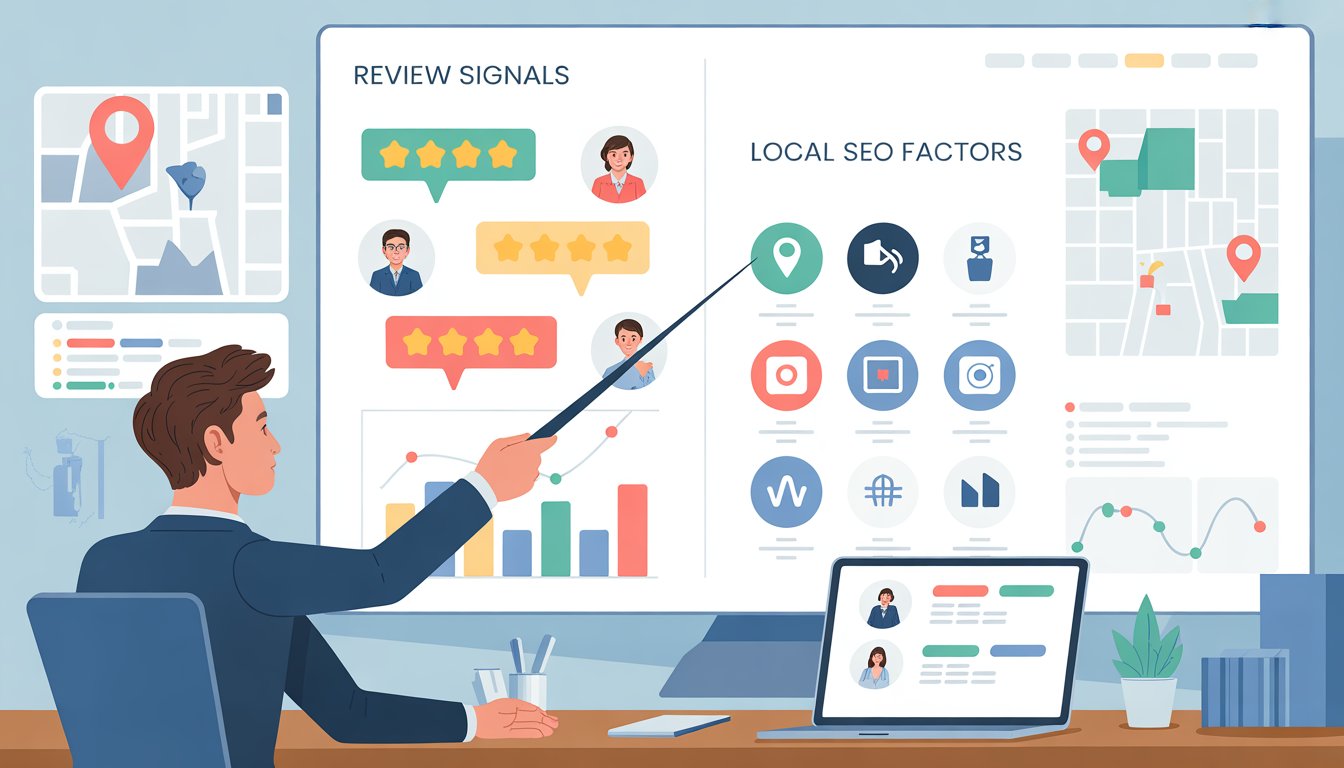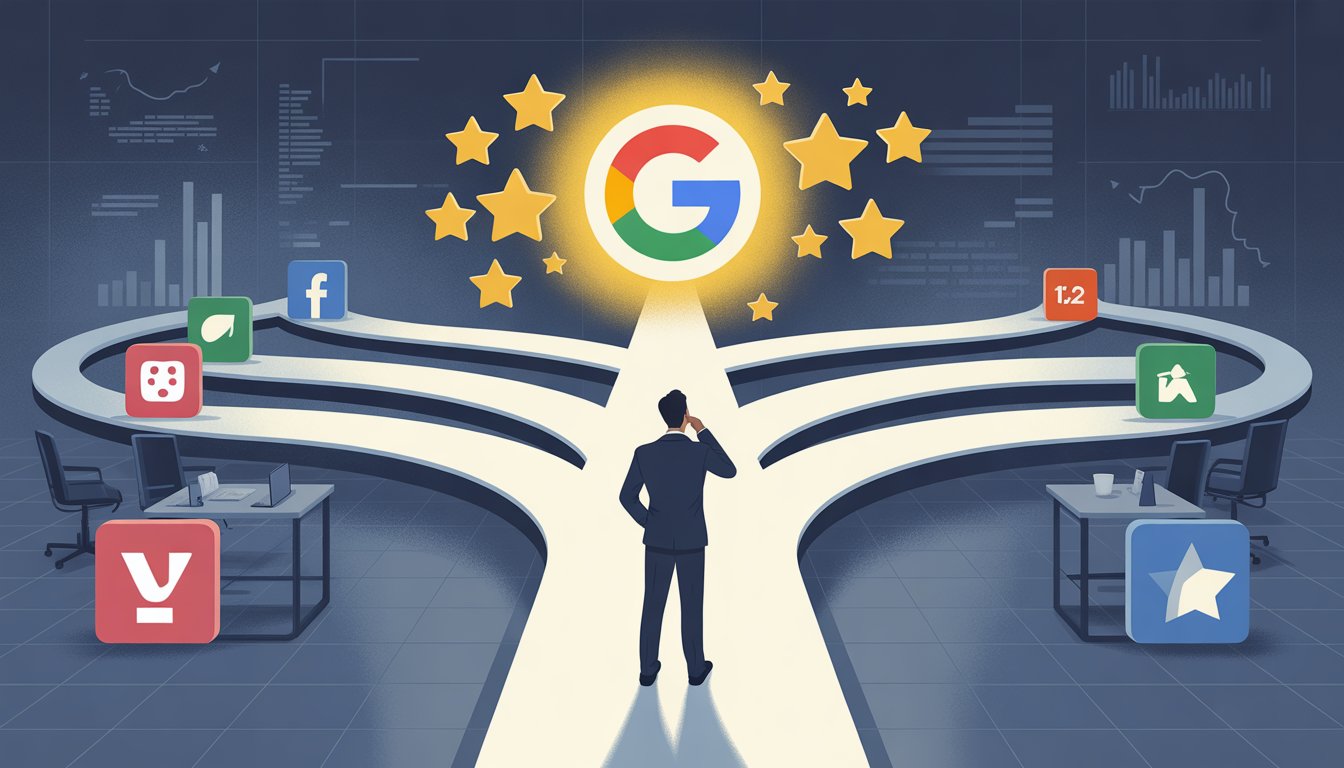AI search tools are rapidly changing how people find information online, but traditional Google search isn't disappearing anytime soon.
While 61% of Gen Z and 53% of Millennials now use AI tools instead of traditional search engines, Google's search results still power much of what these AI systems display.
Traditional Google search results will become less visible but remain important because AI search tools often pull their information from the same ranking systems and sources that traditional search uses.
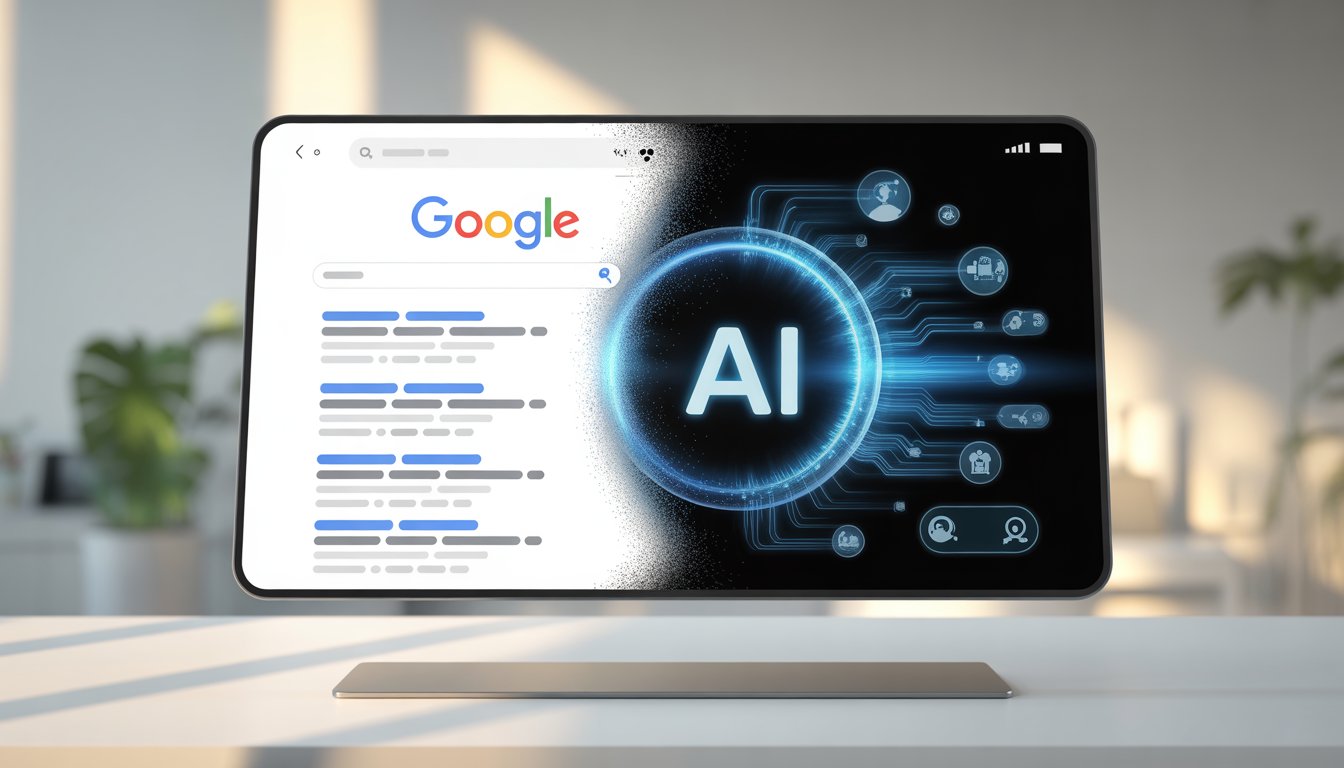
The real shift isn't that traditional search will stop mattering, but that it's becoming less visible to users.
Nearly half of all search results now feature AI overviews at the top of the page, which can reduce clicks to regular website links by 18% to 64%.
This means your content might still rank well in traditional search, but fewer people will actually click through to see it.
Your business needs to adapt to this new reality where AI systems act as gatekeepers between your content and potential customers.
The websites that get featured in AI summaries will capture most of the attention, while those that don't risk becoming invisible even if they rank well in traditional search results.
Key Takeaways
- AI search tools still rely on traditional Google ranking systems, so good SEO practices remain important
- Traditional search results are becoming less visible as AI overviews now appear in nearly half of all searches
- Businesses must optimize for AI summaries and overviews to maintain visibility in the changing search landscape
How AI Search Is Transforming Traditional Google Results
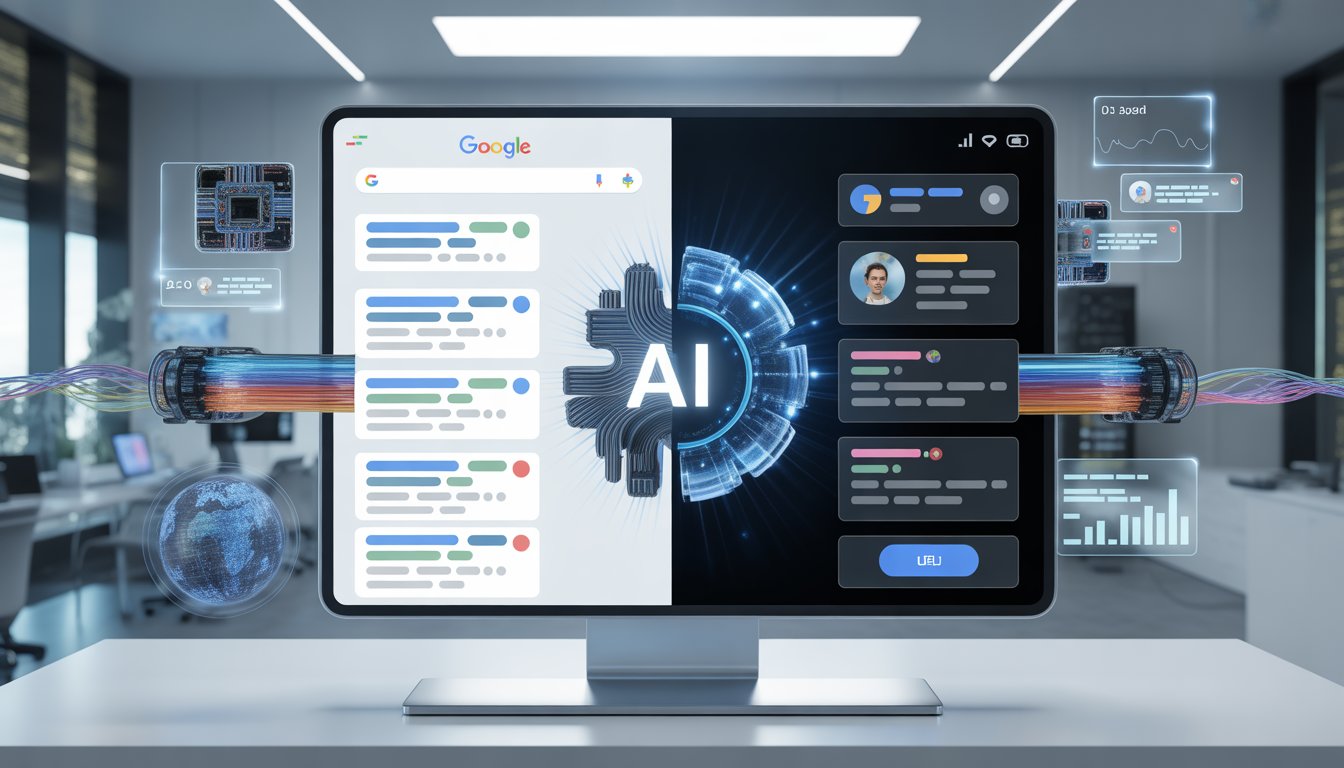
Google is reshaping how search results appear by integrating AI-powered features that change what you see on search pages.
AI Overviews now provide instant answers at the top of results, while personalized responses reduce the need to click through multiple websites.
The Shift from Classic Search Engines to AI-Powered Answers
Traditional search engines showed you a list of ten blue links.
Now AI search provides direct answers before you reach those links.
Google's AI Overviews use advanced reasoning to understand complex questions.
You can ask detailed queries like "find yoga studios in Boston with intro offers and walking distance from Beacon Hill" instead of doing multiple searches.
Key changes in search behavior:
- Users ask longer, more conversational questions
- Search results include AI-generated summaries
- Less need to visit multiple websites for basic information
The Gemini model powering Google's AI search can handle multi-step reasoning.
This means you get comprehensive answers that combine information from several sources into one response.
Your search experience becomes more like having a conversation.
You can ask follow-up questions and get personalized answers based on your specific needs.
Rise of AI Overviews and Zero-Click Search
AI Overviews appear at the top of search results for hundreds of millions of users.
These summaries answer your question without requiring clicks to other websites.
Zero-click search is growing because:
- AI provides instant answers
- Users get what they need faster
- Less time spent browsing multiple sites
Google reports that people use Search more often with AI Overviews.
They also show higher satisfaction with their results.
The AI-generated answers include links to source websites.
However, many users find what they need in the overview itself.
This creates fewer clicks to traditional web results.
You can soon adjust AI Overviews to match your reading level.
Options will include simplified language or more detailed explanations depending on your knowledge of the topic.
Personalization and User Intent in AI Search
AI search engines analyze your specific intent behind each query.
They provide customized results based on what you actually want to accomplish.
Google's AI creates personalized meal plans and trip itineraries directly in search results.
You can modify these plans by asking for changes like "make dinner vegetarian" or "add budget-friendly options."
Personalization features include:
- Custom meal and vacation planning
- Adjustable complexity levels
- Content tailored to your experience level
The search results page now organizes information under AI-generated headlines.
These categories help you explore different angles of your topic more easily.
Video search capabilities let you upload footage of problems you need solved.
The AI analyzes moving objects and provides specific troubleshooting steps.
Your future searches will become more conversational and context-aware.
AI remembers your preferences within a search session to give better follow-up answers.
Comparing Traditional Search Engines and AI Search Models
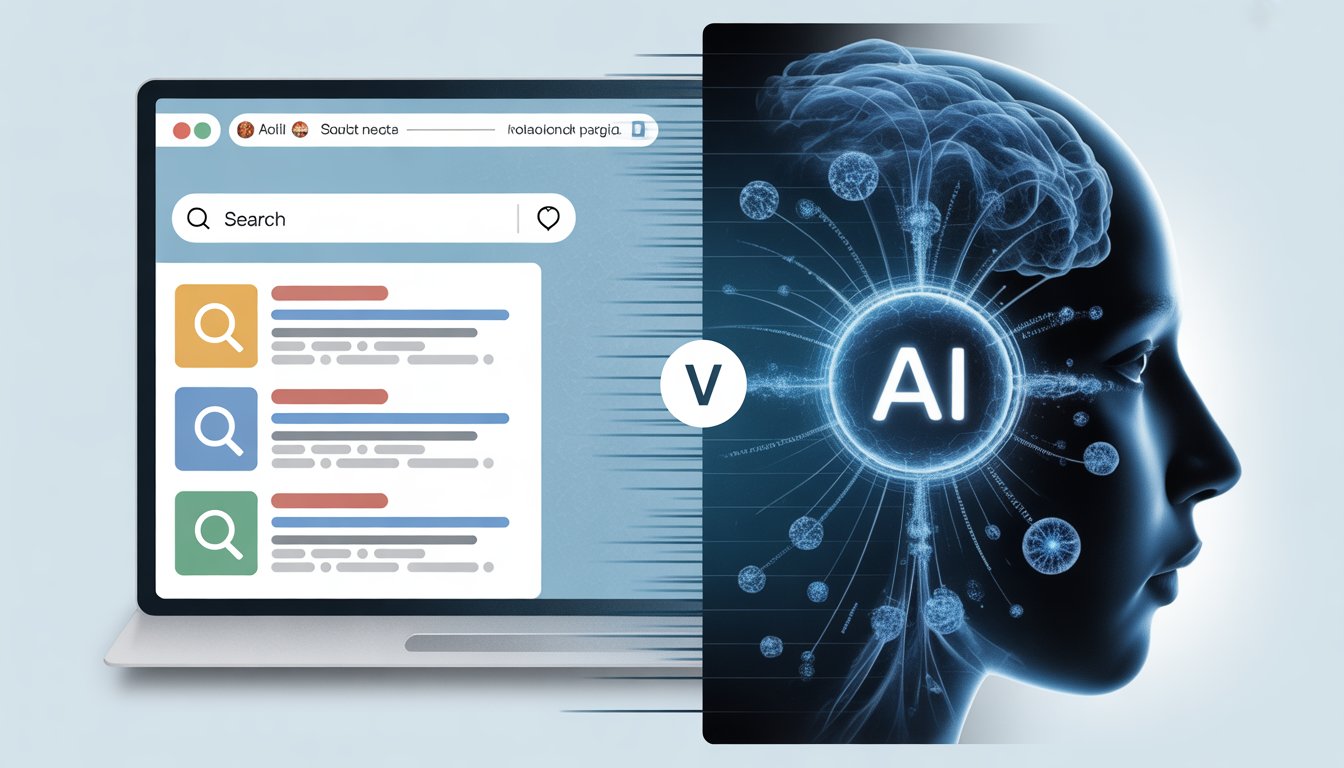
Traditional search engines return ranked lists of web pages, while AI-powered search engines like ChatGPT and Perplexity generate direct answers with citations.
The fundamental difference lies in how these systems process queries and present information to users.
Differences in Information Retrieval
Traditional search engines use algorithms to crawl, index, and rank web pages based on relevance signals.
When you search Google, you get a search engine results page with blue links ranked by authority and relevance.
AI-powered search works differently.
These systems use retrieval augmented generation (RAG) to first find relevant content, then create new responses based on that information.
Key differences include:
- Response format: Traditional search shows website links; AI search provides direct answers
- Information processing: Classic search ranks existing pages; AI search synthesizes multiple sources
- User interaction: Traditional search requires clicking through results; AI search delivers immediate answers
ChatGPT and Perplexity pull information from various sources to create conversational responses.
This means you get answers without visiting multiple websites.
However, AI search engines still rely heavily on traditional search rankings.
Research shows domains that rank well in Google's top 10 results are more likely to be cited in AI-generated answers.
Citations and Authority Signals in AI vs. Classic SERPs
Traditional search engine results pages rely on well-established ranking factors like backlinks, domain authority, and content quality.
Google's algorithm considers hundreds of signals to determine which pages deserve top positions.
AI citations work differently but still favor authoritative sources.
Studies show 92% of Google AI Mode responses feature sidebar links to about 7 unique domains.
Citation patterns reveal important trends:
- Reddit dominates across AI platforms, appearing in most AI-generated responses
- User-generated content platforms like YouTube and Facebook get frequent citations
- Technical documentation sites gain visibility in AI search despite low traditional search rankings
The overlap between traditional search results and AI citations varies by platform.
Perplexity shows 91% domain overlap with Google's top 10 results, while ChatGPT has the weakest overlap.
Strong domain-level rankings correlate strongly with AI visibility.
If your website ranks well for many queries, you're more likely to get AI citations across different platforms.
Role of Featured Snippets and Structured Data
Featured snippets have long been Google's way of providing direct answers in traditional search results.
These snippets extract specific information from web pages to answer user queries without requiring clicks.
Structured data and schema markup become even more critical for AI search engines.
These formats help AI systems understand and extract information from your content more accurately.
Benefits of structured data for AI search:
- Clearer content organization for AI processing
- Better chances of accurate citation
- Improved understanding of content relationships
- Enhanced visibility across multiple AI platforms
AI search engines often pull from different pages within trusted domains compared to traditional search results.
While traditional search highlights homepage content, AI systems reach deeper into websites for specific information.
Commercial and transactional queries trigger responses that are twice as long as informational queries across AI platforms.
This means your content depth should match query intent expectations.
Websites with clean, well-structured documentation perform better in AI citations.
Technical sites like Mapbox gained significant AI visibility through comprehensive, organized content despite limited traditional search presence.
Implications for SEO and Digital Marketing Strategies
The shift to AI-powered search demands fundamental changes to how you approach digital marketing.
Success now requires optimizing for both traditional rankings and AI citation while maintaining the technical foundations that make your site discoverable.
Evolving SEO Tactics for AI and Generative AI
You need to restructure your content to feed Google's generative AI systems effectively.
This means creating clear, structured information that AI models can easily parse and cite.
Focus on comprehensive topic coverage within single pages.
AI Overviews pull from sources that provide complete answers rather than surface-level content.
Use these formatting techniques:
- Clear headings that match search queries
- Bullet points for easy scanning
- Definition lists for complex topics
- Short paragraphs under 60 words
Your content must satisfy both human readers and AI models.
Write concise answers within longer content pieces.
Place key information in the first 150 words of each section.
Track your AI Overview appearances in tools like SEMrush or Google Search Console.
Monitor which pages get cited versus those that only rank organically.
Create content clusters around related topics.
AI systems favor sites that demonstrate expertise across connected subjects rather than isolated pages.
Answer Engine Optimization vs. Traditional SEO
Answer Engine Optimization focuses on becoming a cited source in AI-generated responses rather than just ranking in traditional results.
Traditional SEO still matters for the foundation.
Nearly 75% of AI Overview sources already ranked in the organic top 10.
Your content needs strong SEO fundamentals to be considered for AI citation.
Key differences in approach:
Traditional SEOAnswer Engine OptimizationFocus on click-through ratesFocus on citation and authorityKeyword-centric contentIntent-focused comprehensive answersPage-level optimizationTopic cluster optimizationBacklink quantitySource credibility and E-E-A-T
Optimize for conversational queries that trigger AI responses.
Users ask follow-up questions in AI Mode, so anticipate related questions within your content.
Build expertise signals through author bios, citations, and industry recognition.
AI systems prioritize trustworthy sources, especially for health, finance, and legal topics.
Technical Foundations: Site Speed, Mobile Usability, and Schema
Your technical SEO foundation becomes more critical as AI systems evaluate site quality.
Fast-loading, mobile-optimized sites with structured data have better chances of AI citation.
Site speed directly impacts AI crawling efficiency.
Google's systems need to quickly access and process your content.
Aim for Core Web Vitals scores in the green across all pages.
Mobile usability matters more than ever.
AI Overviews appear most frequently on mobile searches where screen space is limited.
Ensure your content displays properly on small screens.
Schema markup helps AI systems understand your content context.
Use these schema types:
- Article schema for blog posts
- FAQ schema for question-based content
- Product schema for e-commerce
- Local business schema for location-based services
Implement structured data consistently across your site.
Google Search Console's Rich Results Test shows which schema implementations work correctly.
Clean URL structures and internal linking help AI systems understand your site's information architecture.
Create clear navigation paths between related topics and maintain consistent categorization.
Measuring Brand Visibility in the Age of AI Search
AI search platforms now require new metrics beyond traditional click-through rates and rankings.
Brand visibility in AI citations and mentions has become the primary indicator of search success, even as zero-click search continues to grow.
Tracking Brand Mentions in AI Overviews and Chatbots
AI citations represent your brand's new search currency.
When AI tools like ChatGPT or Google's AI Mode reference your content, they're giving you authority without clicks.
Track these mentions across multiple platforms.
Set up alerts for your brand name in AI responses.
Monitor competitor citations to see who's gaining visibility.
Key metrics to track:
- Number of AI citations per month
- Context of brand mentions (positive, neutral, negative)
- Citation frequency compared to competitors
- Which content pages get cited most often
Google Search Console now includes some AI Mode data, but it's mixed with regular search metrics.
You'll need third-party tools to get complete AI citation tracking.
Featured snippets often become AI citations.
If your content appears in featured snippets, it's more likely to be referenced by AI tools.
Navigating Declining CTRs and Rise of Impressions
Zero-click search is expanding rapidly with AI answers.
Your content might reach thousands of users without generating a single website visit.
Focus on impression volume over click-through rates.
High impressions with low CTRs often mean AI tools are using your content to answer questions directly.
This shift requires new thinking about success metrics:
Traditional MetricAI-Era AlternativeClick-through rateCitation frequencyPage viewsBrand mentionsSession durationAnswer inclusion rate
Track impression-to-citation ratios.
High impressions with frequent AI citations show your content has authority, even without clicks.
Monitor your brand's share of voice in AI responses for industry topics.
Branded Search Impressions and Authority Indicators
Branded search impressions reveal how often people specifically look for your company. These searches matter more as AI reduces discovery through generic queries.
Strong branded search volume indicates brand recognition that transcends search format changes. Users who know your name will find you regardless of AI or traditional results.
Authority indicators to monitor:
- Branded keyword impression growth
- Direct navigation to your site
- Social media mentions and engagement
- Industry publication references
Track how often AI tools cite your domain versus individual pages. Domain-level citations suggest broader authority recognition.
Brand visibility in AI search requires consistent content creation and thought leadership.
The brands that get cited most often publish helpful, detailed content that AI tools can reference reliably.
Challenges and Opportunities for Content Creators and Businesses
AI-powered search is creating new ways to reach audiences while reducing traditional website traffic. Content creators need to adapt their strategies to work better with AI systems and find new traffic sources.
Adapting Content for Increased AI Citation
Your content needs to be structured for AI systems to find and use it. AI search tools look for clear, factual information that answers specific questions.
Create content that AI can easily understand:
- Write clear headlines that match common search questions
- Use simple language and short sentences
- Include data, statistics, and specific facts
- Structure information with bullet points and numbered lists
AI systems prefer authoritative sources. Build credibility through expert quotes and reliable data.
Wikipedia, Reddit, and YouTube get cited most often in AI summaries.
Focus on being the best source for specific topics.
Changes in Traffic Sources and User Engagement
Traditional Google search traffic is dropping fast. Only 1% of users click through to websites after seeing AI summaries.
Diversify your traffic sources:
- Build a strong presence on Reddit and YouTube
- Create direct relationships with your audience
- Use email lists and social media followers
- Partner with other content creators
Users who see AI search results are 50% less likely to visit websites. About 26% of people stop searching entirely after reading an AI summary.
You must create content that makes people want to visit your site directly. Use multimedia content, interactive features, and exclusive information that AI summaries cannot fully capture.
Outlook: The Evolution of Search and What Comes Next
Search is rapidly changing from simple link lists to intelligent conversations. Google will adapt its search results while maintaining some traditional elements.
The future will blend AI answers with human-verified content.
Predictions for Google Search and SERPs
Google's search results will look very different by 2030. AI-powered answers will appear at the top of most searches.
You'll see fewer traditional blue links.
Key Changes Coming to SERPs:
- AI Overviews will expand to cover 80% of search queries
- Traditional organic results will move further down the page
- Voice and conversational search will become standard
- Visual and video content will get priority placement
Google is investing $75 billion in AI to stay competitive. The company's CEO called 2025 "critical" for addressing the ChatGPT threat.
Search results will become more personalized. Google's AI will learn your preferences and adjust answers accordingly.
This means two people searching the same thing might see different results.
The classic Google search box may become less important over time. Google's own executives suggest AI interfaces will take center stage instead.
Balance of AI and Human-Curated Results Moving Forward
You won't see AI completely replace human-created content. Instead, search engines will blend both approaches for better results.
How This Balance Will Work:
- Quick facts: AI will provide instant answers
- Complex topics: Links to expert-written articles will remain important
- Local searches: Human-verified business information will stay crucial
- Shopping: Product reviews from real users will complement AI recommendations
AI tools work best for detailed explanations and multi-step research. Traditional search still wins for simple factual queries and finding specific websites.
Google and other search engines know that users want both speed and accuracy. They're building systems that use AI for convenience while keeping human expertise for reliability.
This hybrid approach means your content strategy should focus on both AI optimization and traditional SEO methods.
Frequently Asked Questions
AI search technology brings major changes to how search engines work and how you find information online. These shifts affect everything from website rankings to your daily search habits.
How will AI-enhanced search engines impact traditional search engine optimization practices?
You'll need to focus more on creating helpful, detailed content that answers specific questions. AI search engines look for comprehensive information rather than just keywords.
Your website needs to provide clear, direct answers to user questions. This means writing content that explains topics thoroughly instead of just targeting search terms.
You should optimize for featured snippets and structured data. AI systems often pull information from these sources to create their responses.
Link building remains important, but content quality matters more than ever.
What changes might users expect in their search experiences as AI-powered search becomes more prevalent?
You'll get direct answers to your questions instead of a list of links to click through. AI search engines provide complete responses right on the search page.
Your searches can become more conversational. You can ask follow-up questions and get responses that build on your previous queries.
You might see fewer traditional website results. AI systems prioritize giving you the information directly rather than sending you to multiple websites.
Search results may sometimes contain incorrect information. Studies show AI answers can be wrong, so you'll need to verify important facts from original sources.
What role will human-generated content play in search engine results as AI technology advances?
Your original content still provides the foundation that AI systems use to generate answers. AI pulls information from human-created websites, articles, and databases.
You'll see more emphasis on expertise and authority. Search engines want content from real people who know their subjects well.
Personal experiences and opinions remain valuable because AI cannot create these unique perspectives. Your firsthand knowledge and insights matter more than generic information.
Human fact-checking becomes more important as AI-generated content increases.
Can traditional search engines remain competitive with the rise of AI-specific search platforms?
Traditional search engines are adding AI features to stay relevant. Google has introduced AI overviews and other smart search tools.
You'll likely see hybrid approaches rather than complete replacement. Many search engines combine traditional results with AI-generated answers.
Traditional search still works better for certain types of queries. When you need to browse multiple sources or find specific websites, link-based results help more than AI summaries.
User habits change slowly, and many people still prefer familiar search methods.
Are there perceived benefits to sticking with conventional search engines despite the emergence of AI-powered options?
You can verify information more easily with traditional search results. Seeing multiple sources helps you check facts and get different perspectives.
Traditional search gives you more control over your information sources. You can choose which websites to trust instead of relying on AI to select information for you.
You'll find traditional search more reliable for recent events and news. AI systems sometimes have outdated information or miss breaking developments.
Browsing search results helps you discover related topics and unexpected information. AI answers are more focused but may miss interesting connections you would find through traditional searching.
How might market share between traditional and AI-powered search engines shift over time?
You'll likely see gradual adoption rather than sudden changes. Most users stick with familiar search engines while slowly trying new AI features.
Google maintains its dominant position by integrating AI into existing search. This strategy lets them keep users while offering new capabilities.
Specialized AI search engines may capture specific use cases. You might use different tools for research, quick facts, or creative tasks.




